Owen, James Ernest (Leading Aircraftman)
Killed 1941-April-14
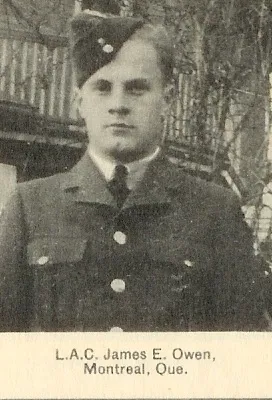

Birth Date: 1921
Born:
Parents: Son of Thomas and Annie M. Owen, of Peterborough, Ontario, Canada.
Spouse:
Home: Peterborough, Ontario
Enlistment:
Enlistment Date: unkown date
Service
RCAF
Unit
402 Sqn- Squadron
We Stand on Guard
Base
Rank
Leading Aircraftman
Position
Service Numbers
R/54870
Unit Desciption
402 Sqn We Stand on Guard ("City of Winnipeg")
History of the Squadron before and during World War II (Aircraft: DH-60 Moth, Lysander 1, Hurricane I, IIA, IIB, IIB(B), Spitfire V, VC, IX, IXB, XIVE, XVI)
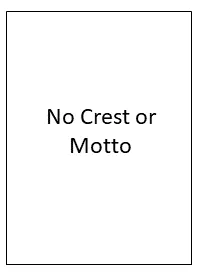
Note that the crest and motto were not granted until after WWII. During the war the squadron had no crest or motto
402 Squadron evolved from No 112 Army Co-operation Squadron (Auxiliary), which was formed at Winnipeg, MB in October 1932, although it did not begin flying training until September 1934, when it received de Havilland DH-60 Moth aircraft. It was renumbered as No 112 Squadron in November 1938. It was mobilized in September 1939 and was assigned to the Canadian Active Service Force for overseas duty and moved to Rockcliffe, ON in February of 1940, being equipped with Westland Lysander Mk. II aircraft with the squadron code XO. It embarked for Britain on 9 June 1940 to join RAF Army Co-operation Command, but the fighting in France was over before the squadron could become operational. On arrival to England, the squadron code was changed to AE. The unit remained with Army Co-operation Command until December 9, 1940, when it transferred to Digby, Lincolnshire, UK ![]()
and was re-designated No 2 (Fighter) Squadron. On March 1, 1941, it was renumbered No 402 (Fighter) Squadron. The squadron was issued with Hawker Hurricane Mk I’s, but these were followed by Hurricane IIB and IIB(B) versions. The latter were the fighter-bomber versions of the aircraft ("Hurribombers"), and the squadron was the first RCAF unit to be equipped with them. The first bombing sortie was on November 1, 1941. The unit circulated between different Groups of Fighter Command in the course of 1941 and early 1942, being based at a number of airfields: Digby, Lincolnshire (12 Group), Martlesham Heath, Suffolk (11 Group), Ayr, Scotland (13 Group), Southend, Essex (11 Group) Warmwell, Dorset, Colerne, Wiltshire and Fairwood Common, S. Wales (10 Group), before joining the 11 Group Canadian Kenley Wing in May 1942. By now it was equipped with Supermarine Spitfire Mk Vb and later Mk IX. It remained at Kenley until March 1943, taking part in fighter sweep operations over France. In March 1943 it was back to Digby, where the squadron was trained for possible overseas postings involving aircraft carriers, although this came to nothing. In August the squadron spent a number of weeks back on the South Coast again flying RAMROD and RODEO operations. The squadron remained at Digby and Wellingore, Lincolnsire until the end of April 1944, when it joined No 142 (RCAF) Wing of No 85 Base Group of the 2nd Tactical Air Force (TAF) at Horne, Yorkshire and then Westhampnett and Merston, Sussex. The squadron provided low level beach cover and bomber escort operations after the D-Day landings in June 1944. In August, 1944 the squadron was equipped with Spitfire Mk XIVs and was focused on DIVER operations, the interception of German V-1 flying bomb missiles. From 30 September onwards, the squadron was again attached to 2nd TAF No 125 (RAF) Wing and subsequently No 126 (RCAF) Wing as they moved through Belgium and Germany. The Squadron was disbanded at Fassberg, Germany ![]() on July 10, 1945.
on July 10, 1945.
In the course of the war, the squadron flew 10,504 sorties for the loss of 47 pilots, of whom 36 were killed or missing. There were two aces among the squadron pilots, Squadron Leader G.W. Northcott, DSO, DFC and Bar, and Pilot Officer J.D. MIchner. The squadron was credited with 49 enemy aircraft destroyed and 37 damaged, and 5 V-1 flying bombs were destroyed. The squadron was awarded 4 DFCs and 1 Bar to DFC. Battle Honours were: Defence of Britain, 1941-1944; English Channel and North Sea, 1941-1944; Fortress Europe, 1941-1944; Dieppe; France and Germany, 1944-1945; Normandy, 1944; Arnhem; Rhine.Wikipedia, Rawlings, Kostenuk and Griffin
Maps for Movements of 402 Squadron 1940-45
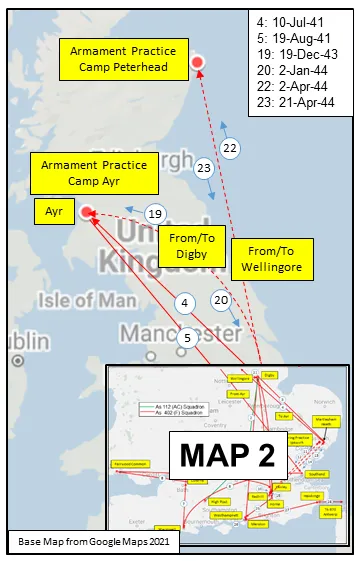
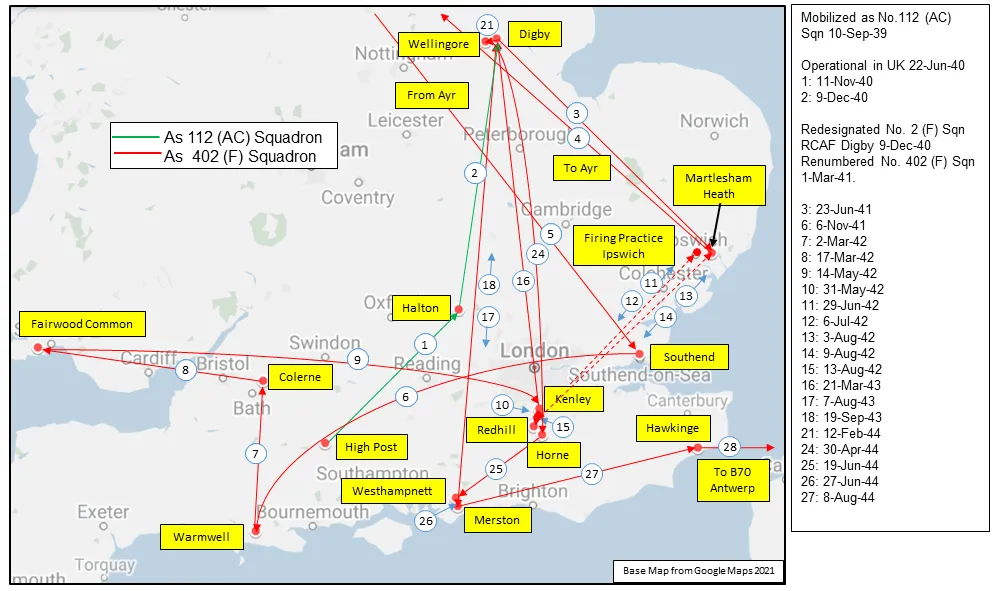
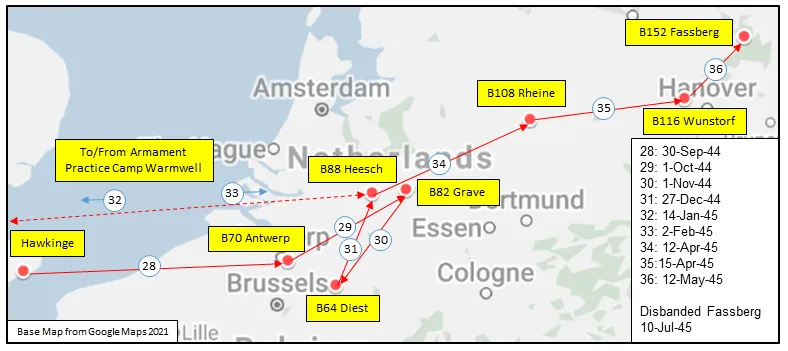
402 Squadron History Summary 1940-45
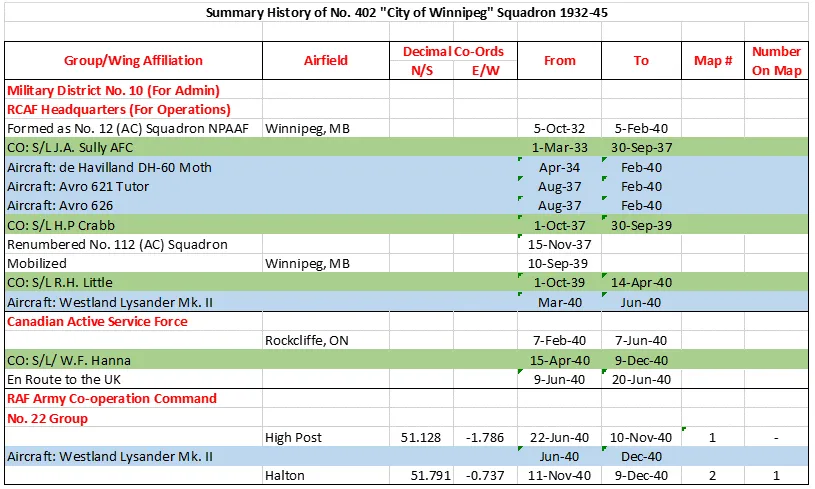
402 Squadron History Summary 1940-45 Page 2
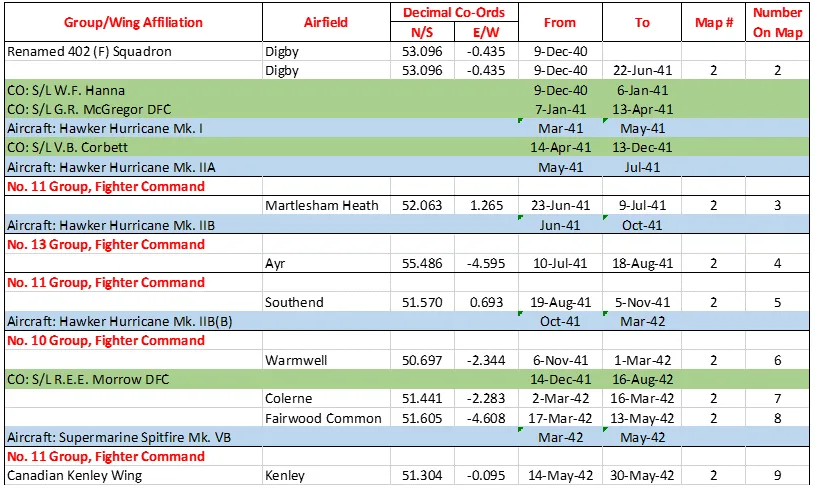
402 Squadron History Summary 1940-45 Page 3
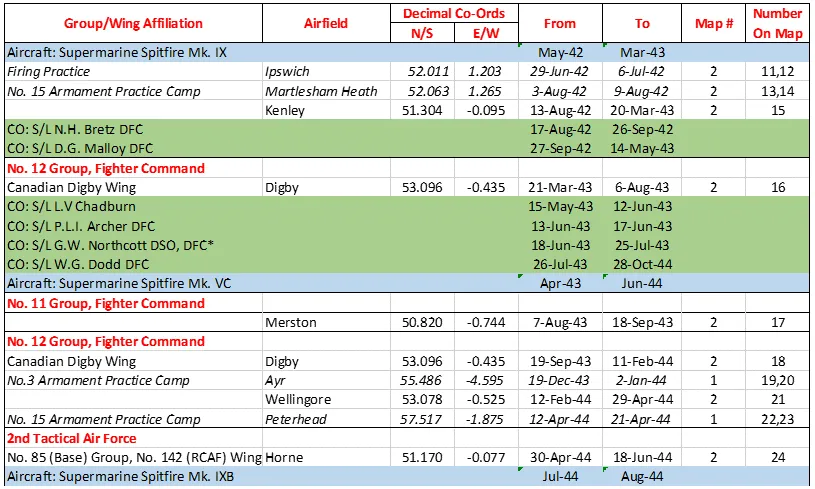
402 Squadron History Summary 1940-45 Page 4
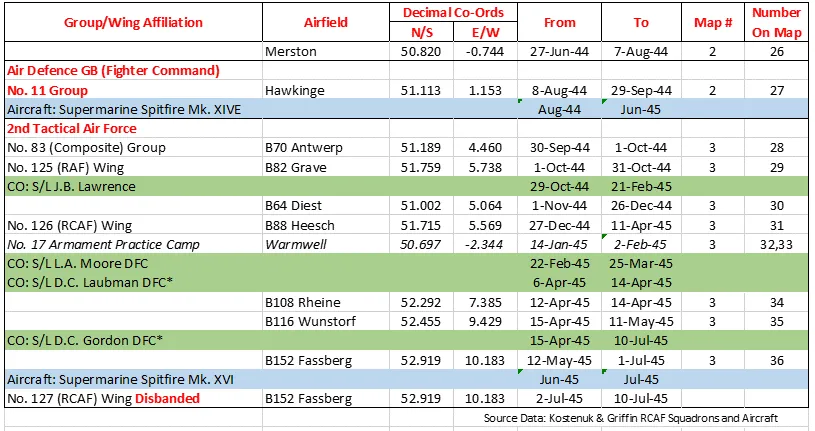
History of the Squadron Post-WWII (Aircraft: Harvard II, Vampire III, Mustang IV, Expeditor, Otter, Dakota, Dash 8)
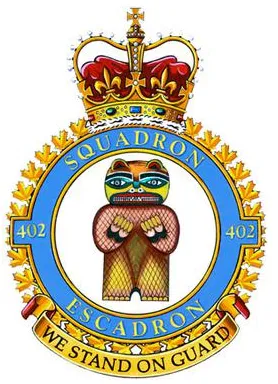
The squadron was re-formed as No 402 (FB) Sqn (Aux) in Winnipeg, Manotoba ![]() on 15 April 1946. It was re-designated No 402 (F) Sqn (Aux) on 1 March 1947. At that time it was flying North American Harvard Mk. II aircraft. It was re-designated No 402 (FB) Sqn (Aux) on 1 April 1949 by this time flying de Havilland Vampire III aircraft. These were later replaced by the North American Mustang IV (P-51D). It was retitled No 402 "City of Winnipeg" (FB) Sqn (Aux) on 10 November 1953. With a change of function to transport the squadron was redesignated No 402 "City of Winnipeg" (T) Sqn (Aux) on 25 January 1957, flying Beechcraft Expeditor and later de Havilland Otter aircraft. Although it had a Transport designation, it acted as a navigation school. It was further re-designated No 402 "City of Winnipeg" Sqn (Aux) on 1 April 1958. It was integrated into the CAF as No 402 "City of Winnipeg" Air Reserve Squadron on 1 February 1968. In 1975 the squadron replaced its Otters with Douglas CC-129 Dakotas as light transport and search and rescue aircraft. They were the last Canadian squadron to fly the Dakota.
on 15 April 1946. It was re-designated No 402 (F) Sqn (Aux) on 1 March 1947. At that time it was flying North American Harvard Mk. II aircraft. It was re-designated No 402 (FB) Sqn (Aux) on 1 April 1949 by this time flying de Havilland Vampire III aircraft. These were later replaced by the North American Mustang IV (P-51D). It was retitled No 402 "City of Winnipeg" (FB) Sqn (Aux) on 10 November 1953. With a change of function to transport the squadron was redesignated No 402 "City of Winnipeg" (T) Sqn (Aux) on 25 January 1957, flying Beechcraft Expeditor and later de Havilland Otter aircraft. Although it had a Transport designation, it acted as a navigation school. It was further re-designated No 402 "City of Winnipeg" Sqn (Aux) on 1 April 1958. It was integrated into the CAF as No 402 "City of Winnipeg" Air Reserve Squadron on 1 February 1968. In 1975 the squadron replaced its Otters with Douglas CC-129 Dakotas as light transport and search and rescue aircraft. They were the last Canadian squadron to fly the Dakota.
In the late 1980s, the name changed to 402 "City of Winnipeg" Transport and Training Sqn. with the de Havilland Canada CC/CT-142 Dash 8 used to provide light transport and training for the Canadian Forces Air Navigation School (CFANS). In 2000, the two CC-142 Dash 8 light role.[8] By June 2009, and the changing demands of air forces worldwide, the training was adapted to include AESOPs (Airborne Electronic Sensor Operators) as well as Air Navigators now being called ACSOs (Air Combat Systems Officers). With the change in the trade name, CFANS became 1 Canadian Forces Flight Training School (1CFFTS). 402 Sqn and 1CFFTS continued to work together to provide ab-initio training. In 2014, 1CFFTS was amalgamated into 402 Sqn, who took over the full training syllabus alongside the aircraft maintenance and pilot employment. 402 Sqn. continues the long tradition of training Commonwealth partners from the United Kingdom, Australia and New Zealand, as well as NATO allies from Germany and Norway. The program has further expanded to include, among others, Singapore and South Korea.